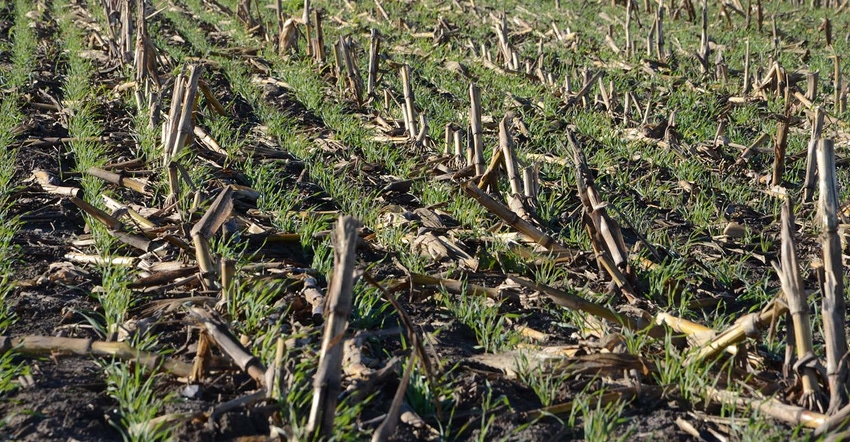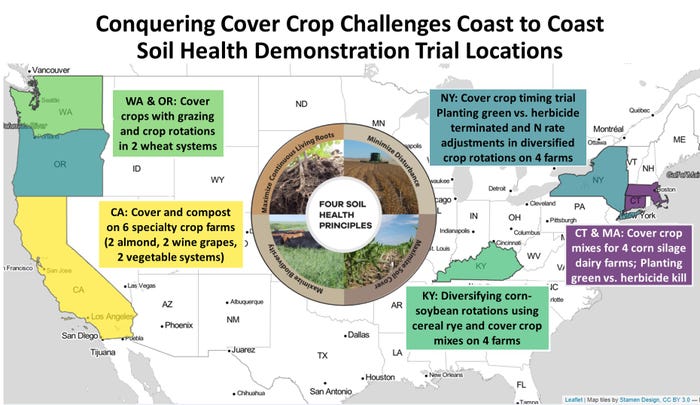October 5, 2020

American Farmland Trust has received a $2.6-million grant through the USDA’s Natural Resource Conservation Service On-Farm Conservation Innovation Trials, a component of the Conservation Innovation Grants program, to fund its “Conquering Cover Crop Challenges Coast to Coast” project.
Through 20 on-farm demonstration trials across the nation and a comprehensive soil, economic, and social evaluation system, AFT will test solutions and generate five years of results that will help overcome barriers to cover crop adoption.
Specifically, the demonstration project will:
Address cover crop establishment challenges in water-limited, dryland wheat systems in Washington and Oregon by coupling cover cropping, livestock integration, and/or crop rotation diversification;
Address cover crop establishment challenges unique to high value, high-input specialty crops, and high disturbance vegetable row cropping in water-limited valleys in California by demonstrating the benefits of cover crop and compost adoption;
Diversify the traditional corn-soybean rotation and enhance soil health in Kentucky by converting from a typical corn-bean system to a diversified rotation of corn-rye-soybeans-cover crop; the rye will be no-till planted into corn residue, with most farms already using conservation tillage;
Address cover crop timing and termination challenges in cool, humid regions in (1) New York by demonstrating the benefits of a technique called “planting green” and (2) in Connecticut and Massachusetts, demonstrating how shorter maturity silage corn varieties can improve cover crop establishment in systems currently using or interested in adopting no-till practices;
Optimize nitrogen inputs through adaptive management as part of the overall Soil Health Management System in New York.

AFT will partner with 13 local conservation districts, university extension departments and the private sector across seven states. The team will:
Collect more than 500 soil samples and conduct annual in-field assessments that will provide data for NRCS’ emerging national soil health database;
Further develop AFT’s soil health economic calculator created under a 2018 CIG grant -- Quantifying Economic and Environmental Benefits of Soil Health – to better analyze each farmer’s existing soil health management systems and to predict long-term results;
Conduct social indicator surveys that will pinpoint the project strategies that were most effective at supporting farmers in adopting a soil health management system;
Provide financial support to farms to compensate for the risks involved in changing to cover crops;
Provide technical support to farms that guide them as they encounter obstacles and adapt management strategies; and
Share key findings with farmers and agricultural professionals to encourage adoption of conservation practices by neighboring farmers.
“This grant enables us to generate essential data to support farmers during their transition to a full Soil Health Management System,” said Jennifer Moore-Kucera, PhD, climate initiative director and project lead. “It gives us the opportunity to provide farmers with the technical and financial assistance necessary to break down the place-based barriers that individual farmers face in adopting soil health practices. By tracking the short-term shifts in the soil, the cropping system, and the social and economic drivers, we will provide valuable insights to help shortcut the learning process of future adoption.”
“Our insights about how to overcome barriers to good soil health practices will be applicable to the 9.8 farmland million acres growing similar crops in the regions that our project covers. But this grant gives us the opportunity to benefit not just the farmers and agricultural professionals in those regions, but also the millions of Americans who depend on agriculture to be able withstand climate change,” said project co-lead, Michelle Perez, AFT water initiative director. “Soil health practices such as cover crops, no-till, nutrient management, crop rotation, and livestock incorporation will all help make the soil healthier and thus more resilient to climate change and water, nutrient, and sediment runoff.”
The project will begin in January 2021 and run through the end of 2025. Every year, AFT will publish summary reports on the changes in the soil in response to the adopted soil health practices. AFT will also publish summary reports of the economic effects of the soil health practices on the farmers’ bottom line in years two, three, and four and summary reports on the social science findings on the effectiveness of our interventions in years two, four, and five.
Source: American Farmland Trust, which is solely responsible for the information provided and is wholly owned by the source. Informa Business Media and all its subsidiaries are not responsible for any of the content contained in this information asset.
Read more about:
ResearchYou May Also Like




